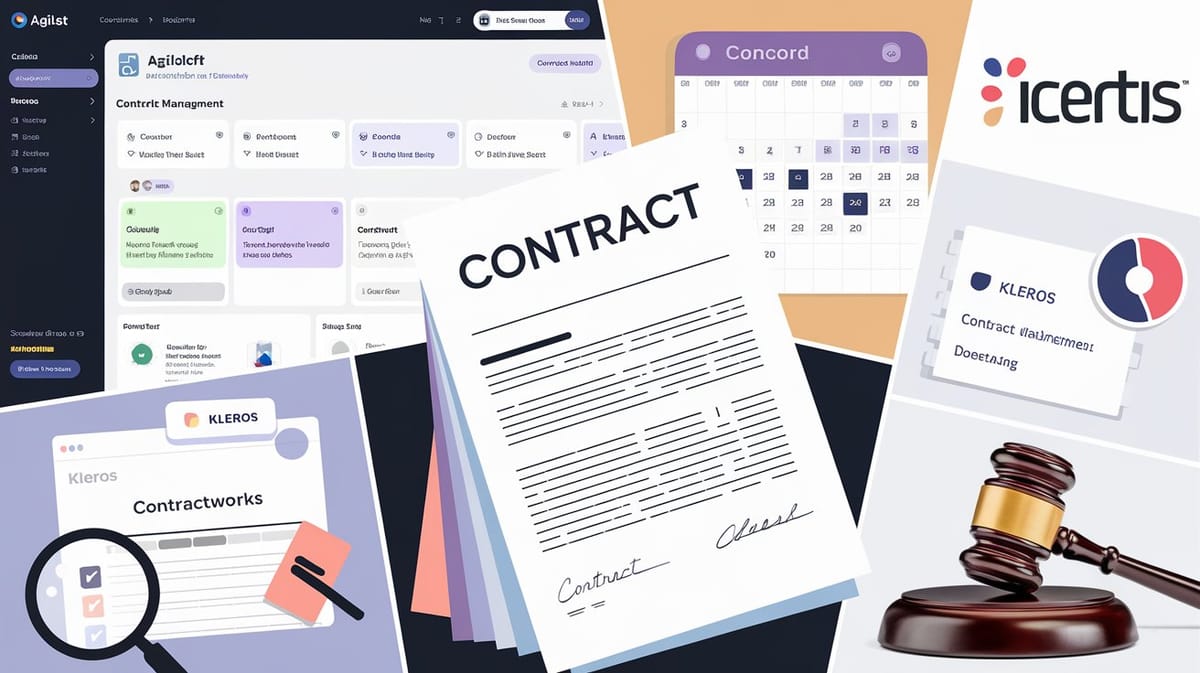Top 7 SaaS Contract Management Softwares

In 2025, the demand for SaaS (Software as a Service) contract management tools has surged as organizations increasingly rely on cloud-based solutions to streamline their operations. Managing contracts effectively is critical for businesses to ensure compliance, reduce costs, and improve operational efficiency. SaaS contract management software provides centralized platforms that automate contract creation, storage, tracking, and renewal processes, reducing manual errors and saving time.
Let's delves into the top seven SaaS contract management software solutions for 2025, highlighting their key features, ideal use cases, and benefits.
You can also visit Oncely.com to find more Top Trending AI Tools. Oncely partners with software developers and companies to present exclusive deals on their products. One unique aspect of Oncely is its “Lifetime Access” feature, where customers can purchase a product once and gain ongoing access to it without any recurring fees. Oncely also provides a 60-day money-back guarantee on most purchases, allowing customers to try out the products and services risk-free.
Oncely is hunting for the most fantastic AI & Software lifetime deals like the ones below or their alternatives:

1. Contractbook: Best for SMEs Needing Scalability

Overview
Contractbook is a robust SaaS contract management platform designed to cater to small and medium-sized enterprises (SMEs). Its scalability makes it an excellent choice for growing businesses that need a flexible solution to manage their contracts.
Key Features
- Centralized Contract Management: All contracts are stored in a single, secure location.
- Automation: Automates contract workflows, including creation, signing, and renewal.
- Collaboration Tools: Enables teams to collaborate on contracts in real-time.
- Integrations: Supports integrations with popular tools like Slack, Zapier, and Google Workspace.
Benefits
- Reduces manual effort by automating repetitive tasks.
- Scales with business growth, making it ideal for SMEs.
- Enhances team collaboration and contract accuracy.
Ideal Use Case
Contractbook is perfect for SMEs looking to streamline contract management without investing in overly complex systems.
2. ContractWorks: Best for Secure Document Storage

Overview
ContractWorks stands out for its emphasis on security and ease of use. It is designed for organizations that prioritize secure storage and management of sensitive contract documents.
Key Features
- Secure Storage: Advanced encryption and access controls ensure data security.
- Customizable Alerts: Automated reminders for contract deadlines and renewals.
- Reporting Tools: Provides insights into contract performance and bottlenecks.
- Drag-and-Drop Interface: Simplifies document uploading and organization.
Benefits
- Ensures compliance with data protection regulations.
- Reduces the risk of missed deadlines with automated alerts.
- Offers a user-friendly interface for quick adoption.
Ideal Use Case
ContractWorks is ideal for organizations handling sensitive contracts, such as legal firms or healthcare providers.
3. Gatekeeper: Best for Compliance Management

Overview
Gatekeeper is a comprehensive contract management tool designed to enhance compliance and risk management. It is particularly useful for businesses operating in highly regulated industries.
Key Features
- Compliance Dashboards: Tracks compliance status in real-time.
- Vendor Management: Centralizes vendor contracts and performance tracking.
- AI-Powered Insights: Uses AI to identify risks and opportunities in contracts.
- Workflow Automation: Automates approval processes and contract renewals.
Benefits
- Reduces compliance risks with real-time tracking.
- Improves vendor relationships through centralized management.
- Enhances decision-making with AI-driven insights.
Ideal Use Case
Gatekeeper is best suited for businesses in industries like finance, healthcare, and government that require stringent compliance management.
4. RazorSign: Best for Quick and Easy Electronic Signature Workflows

Overview
RazorSign focuses on simplifying electronic signature workflows, making it an excellent choice for businesses that require fast and efficient contract signing processes.
Key Features
- Electronic Signatures: Facilitates legally binding e-signatures.
- Mobile-Friendly: Allows users to sign contracts on the go.
- Audit Trails: Tracks every action taken on a contract for accountability.
- Template Library: Offers pre-built templates for common contract types.
Benefits
- Speeds up contract signing processes.
- Enhances user convenience with mobile compatibility.
- Ensures transparency with detailed audit trails.
Ideal Use Case
RazorSign is ideal for sales teams and remote workers who need a quick and reliable e-signature solution.
5. PandaDoc: Best for Sales Teams

Overview
PandaDoc is a versatile contract management platform tailored to the needs of sales teams. It streamlines the proposal and contract creation process, helping sales professionals close deals faster.
Key Features
- Drag-and-Drop Editor: Simplifies the creation of proposals and contracts.
- Real-Time Collaboration: Allows multiple stakeholders to work on documents simultaneously.
- Analytics: Tracks document views and interactions.
- CRM Integration: Integrates seamlessly with tools like Salesforce and HubSpot.
Benefits
- Improves sales efficiency by automating document workflows.
- Provides insights into customer behavior with analytics.
- Enhances collaboration between sales and legal teams.
Ideal Use Case
PandaDoc is perfect for sales teams looking to streamline their contract processes and improve customer engagement.
6. CloudEagle: Best for Vendor Management

Overview
CloudEagle combines SaaS management, procurement, and contract management capabilities into a single platform. It is particularly effective for organizations managing multiple vendors.
Key Features
- Vendor Management: Tracks vendor performance and contract terms.
- SaaS Spend Analytics: Provides insights into software usage and costs.
- Centralized Repository: Stores all contracts in a secure, searchable database.
- Automated Renewals: Sends reminders and automates renewal processes.
Benefits
- Reduces SaaS spend by identifying underutilized licenses.
- Improves vendor relationships through better contract management.
- Enhances operational efficiency with automation.
Ideal Use Case
CloudEagle is ideal for organizations with a large SaaS portfolio looking to optimize vendor management and reduce costs.
7. Cobblestone Software: Best for Government Contracts

Overview
Cobblestone Software is a specialized contract management solution designed for government agencies and contractors. It ensures compliance with government regulations and simplifies complex contract workflows.
Key Features
- Regulatory Compliance: Ensures adherence to government contract requirements.
- Advanced Reporting: Tracks contract performance and compliance metrics.
- Workflow Automation: Automates approval and renewal processes.
- Customizable Templates: Offers templates tailored to government contracts.
Benefits
- Reduces compliance risks with built-in regulatory features.
- Simplifies complex workflows with automation.
- Enhances transparency with detailed reporting.
Ideal Use Case
Cobblestone Software is best suited for government agencies and contractors managing large-scale projects.
Conclusion
The top seven SaaS contract management software solutions for 2025 cater to diverse business needs, from SMEs seeking scalability to government agencies requiring compliance management. These tools automate critical processes, enhance collaboration, and reduce costs, making them indispensable for modern organizations.
By evaluating your organization's specific requirements and priorities, you can select the most suitable solution from this list. Whether you need secure document storage, streamlined e-signature workflows, or advanced compliance tracking, these platforms offer comprehensive features to meet your needs.





